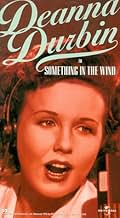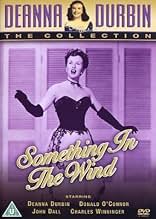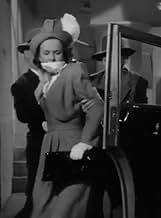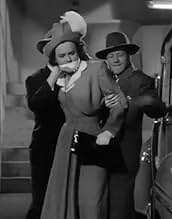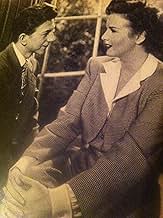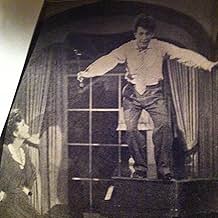VALUTAZIONE IMDb
6,5/10
555
LA TUA VALUTAZIONE
Aggiungi una trama nella tua linguaA grandson of a recently deceased millionaire mistakes a beautiful female disc jockey for her aunt, who once dated the grandfather.A grandson of a recently deceased millionaire mistakes a beautiful female disc jockey for her aunt, who once dated the grandfather.A grandson of a recently deceased millionaire mistakes a beautiful female disc jockey for her aunt, who once dated the grandfather.
- Regia
- Sceneggiatura
- Star
The Williams Brothers
- Singing Quartet
- (as The Four Williams Brothers)
Jacqueline deWit
- Fashion Show Saleslady
- (as Jacqueline de Wit)
Patricia Alphin
- Fashion Show Model
- (non citato nei titoli originali)
Polly Bailey
- Old Woman
- (non citato nei titoli originali)
William Bailey
- Mr. Belton's Assistant
- (non citato nei titoli originali)
Audrey Betz
- Women's Quartette Member
- (non citato nei titoli originali)
Stanley Blystone
- TV Station Guard
- (non citato nei titoli originali)
Betty Blythe
- Society Matron
- (non citato nei titoli originali)
June Bright
- Fashion Show Model
- (non citato nei titoli originali)
Ralph Brooks
- Radio Station Prompter
- (non citato nei titoli originali)
Recensioni in evidenza
Deanna Durbin was a HUGE star in the 1930s-40s--and for a while she was the highest paid actress in Hollywood. However, today most folks probably haven't heard of her. This is because Miss Durbin walked away from her film career when she was in her 20s and going strong-- apparently because she got bored with films and the very formulaic films they put her in over the years. This sort of problem is pretty obvious in "Something in the Wind"--a film where Durbin did quite well but the writing of the film was clearly well below her. Little did Universal Studios realize that in giving her crap scripts like this, they were also pushing their big money-maker out the studio door!
The film begins with Mary Collins (Durbin) leaving work at the radio station when an obnoxious and ill-informed lawyer accosts her and tries to get her to sign some release. She has no idea WHAT he's talking about and finds his comments insulting. However, when she gets home, she learns from the aunt that the lawyer mistook Mary for the aunt--who is also named Mary! It seems that long ago, Aunt Mary was involved with some rich guy but he dumped her and married another woman to please his snobby family. Apparently out of feelings of guilt, the old man had been sending Aunt Mary checks...and the man's family ASSUMED that the money was hush money!
Here is where it starts to get a tad dumb. Because Mary wouldn't talk with the lawyer, the family has her kidnapped and they once again ask young Mary to take some sort of settlement to shut up and go away forever in order to 'preserve the family name'. Out of anger, she lies- -telling them that she had the old man's baby!! Now, she insists they give her a million bucks! She has no intention to take the money--she just wants to make the jerks sweat.
Contrived? Yup! But it gets much worse--as the handsome son inexplicably and very, very, very quickly falls in love with Mary (Durbin--not the old lady!). In addition, there is tons of music and dancing--so much so that it really looks like padding since the plot is so thin. So why does it still manage to get a 5? Well, Durbin, when not singing, is very funny and proves she was simply too good for this tripe.
The film begins with Mary Collins (Durbin) leaving work at the radio station when an obnoxious and ill-informed lawyer accosts her and tries to get her to sign some release. She has no idea WHAT he's talking about and finds his comments insulting. However, when she gets home, she learns from the aunt that the lawyer mistook Mary for the aunt--who is also named Mary! It seems that long ago, Aunt Mary was involved with some rich guy but he dumped her and married another woman to please his snobby family. Apparently out of feelings of guilt, the old man had been sending Aunt Mary checks...and the man's family ASSUMED that the money was hush money!
Here is where it starts to get a tad dumb. Because Mary wouldn't talk with the lawyer, the family has her kidnapped and they once again ask young Mary to take some sort of settlement to shut up and go away forever in order to 'preserve the family name'. Out of anger, she lies- -telling them that she had the old man's baby!! Now, she insists they give her a million bucks! She has no intention to take the money--she just wants to make the jerks sweat.
Contrived? Yup! But it gets much worse--as the handsome son inexplicably and very, very, very quickly falls in love with Mary (Durbin--not the old lady!). In addition, there is tons of music and dancing--so much so that it really looks like padding since the plot is so thin. So why does it still manage to get a 5? Well, Durbin, when not singing, is very funny and proves she was simply too good for this tripe.
Most of the reviewers before mine here have nailed this film, with little difference in most ratings. It is really a bad plot with an even worse screenplay. That is for the story with the young Mary Collins getting kidnapped by the descendants of the wealthy Read patriarch who recently died. The comedy writers must have been on strike, because silly and dopey plots at times have been saved by at least some witty and funny dialog. But this film's script is dull as well as dumb.
It's too bad, because those were the days before Universal was a major studio, and it really did owe its survival to Deanna Durbin. As others have noted, had the studio provided quality scripts and roles for Durbin, she likely would not have walked away from Hollywood and a film career in her late 20s. And movie fans of the 20th century and beyond could have had some more memorable movies - perhaps musicals, to enjoy.
But, even as weak and poor as the plot was, this film didn't flop at the box office. Durbin considered it a dud, and while it wasn't a big hit, fans still turned out for the musical show. And that's truly what saves this film and even earns it a high mark from me - at 7, because of the very good song and dance numbers. Durbin sings several songs, including her hit tune, "Round 'n Round 'n Round" (the Turntable Song), and Donald O'Connor gives a dazzling performance of "I Love a Mystery." For as good as Durbin's singing is with popular music, the routine that helps put this film over just for its musical showcase is the duet she sings with Metropolitan Opera singer and star Jan Peerce - an aria from "Il Travatore."
I am one of those fans who enjoys the good and great musicals of the past. And, I too would like to have seen more films with Deanna Durbin. She not only had a superb voice, but she was a very good actress, especially in comedy. It's a stretch to rate this movie a 7 for the plot and screenplay overall, but the music and dance are exceptional for a musical revue film, and the stars are deserving at least.
Here are some lines that show the level of comedy in this goofy plot
Orchestra leader at the Fashion Show, after a fanfare, announces "And now for our new collection of evening gowns. These gowns are designed to ensure that large amounts of money change hands. The fainthearted are advised not to look."
Mary Collins, "Why, you old crook." Uncle Chester Read, "Heh, at your service, my dear."
Mary Collins, "Would you swindle your own flesh and blood?" Uncle Chester, "It's ever so more simple than swindling strangers."
It's too bad, because those were the days before Universal was a major studio, and it really did owe its survival to Deanna Durbin. As others have noted, had the studio provided quality scripts and roles for Durbin, she likely would not have walked away from Hollywood and a film career in her late 20s. And movie fans of the 20th century and beyond could have had some more memorable movies - perhaps musicals, to enjoy.
But, even as weak and poor as the plot was, this film didn't flop at the box office. Durbin considered it a dud, and while it wasn't a big hit, fans still turned out for the musical show. And that's truly what saves this film and even earns it a high mark from me - at 7, because of the very good song and dance numbers. Durbin sings several songs, including her hit tune, "Round 'n Round 'n Round" (the Turntable Song), and Donald O'Connor gives a dazzling performance of "I Love a Mystery." For as good as Durbin's singing is with popular music, the routine that helps put this film over just for its musical showcase is the duet she sings with Metropolitan Opera singer and star Jan Peerce - an aria from "Il Travatore."
I am one of those fans who enjoys the good and great musicals of the past. And, I too would like to have seen more films with Deanna Durbin. She not only had a superb voice, but she was a very good actress, especially in comedy. It's a stretch to rate this movie a 7 for the plot and screenplay overall, but the music and dance are exceptional for a musical revue film, and the stars are deserving at least.
Here are some lines that show the level of comedy in this goofy plot
Orchestra leader at the Fashion Show, after a fanfare, announces "And now for our new collection of evening gowns. These gowns are designed to ensure that large amounts of money change hands. The fainthearted are advised not to look."
Mary Collins, "Why, you old crook." Uncle Chester Read, "Heh, at your service, my dear."
Mary Collins, "Would you swindle your own flesh and blood?" Uncle Chester, "It's ever so more simple than swindling strangers."
Those who know DD from her "little Miss fixit" movies of the 1930s will be very surprised by this film. She is now an adult, styled very much to look like an even more attractive Gale Storm, and she turns out to be both a very fine actress in romantic comedy and, low and behold, one very sexy singer. Her performance of "Thank you Daddy" is right up there with Rita Hayworth's classic Gilda performance. Frankly, she is far more interesting in this movie, at least to an adult male, than she was in those cute 1930s movies.
Donald O'Conner is also VERY good in this movie. "I love a mystery" is, indeed, a harbinger of what he will do, that much better, in Singing in the Rain. It's not at that level, but it's very good.
The character actors and actresses all deliver fine performances.
And Jan Peerce as the jail keep is not to be missed. I grew up on his recordings, when he and Tucker were the two great American tenors. Believe me folks, he was indeed great, the equal of any of his European contemporaries. He does the "Miserere" with DD here, and it's good. Interestingly, she does not take the alternate high note in the last repeat, as was customary in those days and as Kitty Carlile (sp?) does in A Night at the Opera (and Rosa Ponselle does in her recording with Caruso). It's great to have a chance to see Peerce again "live."
The weak elements here are the male romantic lead, as noted by other reviewers, who is a dud, and the music. If this had had a score as memorable as some of Judy Garland's movies of the same era, it would be as memorable as those. DD does a remarkable job with what she's given, but in terms of music, she isn't given much.
I like the teenage DD movies. They're fun. But this shows that DD was better as an adult than as a child star, and that's staying a lot.
------------------------------
I watched this again tonight, and really enjoyed it. Durbin really is more interesting as an adult than as a child star. And she really does a bang-up job of "Thank you Daddy." On second viewing, it's less Rita Hayworth in Gilda than Mary Martin in one of her "My Heart Belongs to Daddy" numbers.
The things that keep this from being a great movie have been pointed out by others: the script is weak, the music, though it several times comes close to being memorable, never really is; and the leading man has no chemistry at all. Durbin does a great job with mediocre material, as does O'Connor, but that won't make a silk purse out of a piglet's ear.
Donald O'Conner is also VERY good in this movie. "I love a mystery" is, indeed, a harbinger of what he will do, that much better, in Singing in the Rain. It's not at that level, but it's very good.
The character actors and actresses all deliver fine performances.
And Jan Peerce as the jail keep is not to be missed. I grew up on his recordings, when he and Tucker were the two great American tenors. Believe me folks, he was indeed great, the equal of any of his European contemporaries. He does the "Miserere" with DD here, and it's good. Interestingly, she does not take the alternate high note in the last repeat, as was customary in those days and as Kitty Carlile (sp?) does in A Night at the Opera (and Rosa Ponselle does in her recording with Caruso). It's great to have a chance to see Peerce again "live."
The weak elements here are the male romantic lead, as noted by other reviewers, who is a dud, and the music. If this had had a score as memorable as some of Judy Garland's movies of the same era, it would be as memorable as those. DD does a remarkable job with what she's given, but in terms of music, she isn't given much.
I like the teenage DD movies. They're fun. But this shows that DD was better as an adult than as a child star, and that's staying a lot.
------------------------------
I watched this again tonight, and really enjoyed it. Durbin really is more interesting as an adult than as a child star. And she really does a bang-up job of "Thank you Daddy." On second viewing, it's less Rita Hayworth in Gilda than Mary Martin in one of her "My Heart Belongs to Daddy" numbers.
The things that keep this from being a great movie have been pointed out by others: the script is weak, the music, though it several times comes close to being memorable, never really is; and the leading man has no chemistry at all. Durbin does a great job with mediocre material, as does O'Connor, but that won't make a silk purse out of a piglet's ear.
When Mary Collins strides out utterly confident on stage to sing, I had a momentary flashback to Ethel Merman in 1959 striding down the theater aisle and calling, "Sing out, Louise, sing out!" Mary Collins, I mean Deanna Durbin at 26, was a supremely confident actress and singer, and there are a few times when you wouldn't want to get in her way. Balancing that are things Merman didn't have...a warm personality, a lovely face, a smile that could win you over and a voice that wouldn't break your eardrums. Merman was an amazing, one-of-a-kind performer; so was Deanna Durbin. What they share is a perfect confidence in their talent.
With Something in the Wind, audiences were watching a romantic comedy with songs featuring a mature young woman they'd been in love with since she was 15. Alone among the child stars of the Thirties, Deanna Durbin grew up on screen while maintaining her stardom, her poise and her box office clout. Here, as Mary Collins, she's a disc jockey who discovers that her aunt who raised her, also named Mary Collins, had been receiving regular checks from a wealthy industrialist. They had once been in love but the marriage plans had been broken up by his family. The whole thing was platonic, but when the old man died his will stated that the financial arrangements must continue. But now the young scion of the family, Donald Read (John Dall), wants to stop the arrangement and pay Mary Collins off. He wants no scandal. He thinks our Mary has been his grandfather's friend. He doesn't realize our Mary has an aunt with the same name. Mary doesn't know what he's talking about but is furious at the implication. Donald is a prig and engaged to a well-bred socialite. His grandmother is a woman who believes breeding is all. His younger brother, Charlie (Donald O'Connor), is much more unconventional. After our Mary is kidnapped and at first kept at the Read family mansion until she agrees to the arrangement, we are in for over an hour of romantic mix- ups, complicated machinations, a perfect lawyer (blind and deaf), six songs by Durbin, three songs and comedy routines by O'Connor, and then true love finding a way. What does the movie add up to? For firm Deanna Durbin fans, a delight. For those who simply like her a lot, a mixed bag.
On the plus side are Durbin and O'Connor. One almost wishes they'd been the happy couple at the end. Durbin sings everything from a bit of Verdi to a down-and-dirty "You want to keep your baby lookin' right, doncha, Daddy?" Her personality shines through. She's funny and sincere. O'Connor is O'Connor and he's great. He has one number, "I Love a Mystery," which is almost a rehearsal for his "Make 'Em Laugh" routine in Singin' in the Rain. The songs, by Johnny Green and Leo Robin, are just fine, with two better than just fine numbers, "The Turntable Song" and "Something in the Wind." And one unexpected and stylishly handled bit features a cameo by Jan Peerce, the great American tenor who had a long career at the Met, as a singing jailer. Durbin is in the jail. It's not long before before they're sharing a duet from Il Trovatore and arguing about who stepped on whose obbligato.
But the movie begins to get tedious when the Mary Collins mix-up is finally discovered, love between Mary and Donald emerges and serious complications concerning proper family breeding sets in. Most problematic is John Dall as Donald Read, the stuffy hero who learns to love. Dall always seemed to me to be not only a limited actor but a man who, just as Lawrence Harvey always seemed genuinely unlikeable, always seemed genuinely artificial. He was unnerving as the artificially sincere killer-for-thrills in Rope a year later, but here he creates a big hole in the movie. He simply isn't interesting enough or strong enough to compete in the comedy or romance departments with Durbin.
With Something in the Wind, audiences were watching a romantic comedy with songs featuring a mature young woman they'd been in love with since she was 15. Alone among the child stars of the Thirties, Deanna Durbin grew up on screen while maintaining her stardom, her poise and her box office clout. Here, as Mary Collins, she's a disc jockey who discovers that her aunt who raised her, also named Mary Collins, had been receiving regular checks from a wealthy industrialist. They had once been in love but the marriage plans had been broken up by his family. The whole thing was platonic, but when the old man died his will stated that the financial arrangements must continue. But now the young scion of the family, Donald Read (John Dall), wants to stop the arrangement and pay Mary Collins off. He wants no scandal. He thinks our Mary has been his grandfather's friend. He doesn't realize our Mary has an aunt with the same name. Mary doesn't know what he's talking about but is furious at the implication. Donald is a prig and engaged to a well-bred socialite. His grandmother is a woman who believes breeding is all. His younger brother, Charlie (Donald O'Connor), is much more unconventional. After our Mary is kidnapped and at first kept at the Read family mansion until she agrees to the arrangement, we are in for over an hour of romantic mix- ups, complicated machinations, a perfect lawyer (blind and deaf), six songs by Durbin, three songs and comedy routines by O'Connor, and then true love finding a way. What does the movie add up to? For firm Deanna Durbin fans, a delight. For those who simply like her a lot, a mixed bag.
On the plus side are Durbin and O'Connor. One almost wishes they'd been the happy couple at the end. Durbin sings everything from a bit of Verdi to a down-and-dirty "You want to keep your baby lookin' right, doncha, Daddy?" Her personality shines through. She's funny and sincere. O'Connor is O'Connor and he's great. He has one number, "I Love a Mystery," which is almost a rehearsal for his "Make 'Em Laugh" routine in Singin' in the Rain. The songs, by Johnny Green and Leo Robin, are just fine, with two better than just fine numbers, "The Turntable Song" and "Something in the Wind." And one unexpected and stylishly handled bit features a cameo by Jan Peerce, the great American tenor who had a long career at the Met, as a singing jailer. Durbin is in the jail. It's not long before before they're sharing a duet from Il Trovatore and arguing about who stepped on whose obbligato.
But the movie begins to get tedious when the Mary Collins mix-up is finally discovered, love between Mary and Donald emerges and serious complications concerning proper family breeding sets in. Most problematic is John Dall as Donald Read, the stuffy hero who learns to love. Dall always seemed to me to be not only a limited actor but a man who, just as Lawrence Harvey always seemed genuinely unlikeable, always seemed genuinely artificial. He was unnerving as the artificially sincere killer-for-thrills in Rope a year later, but here he creates a big hole in the movie. He simply isn't interesting enough or strong enough to compete in the comedy or romance departments with Durbin.
I really did buy the six film package (the Sweetheart Pack) solely for the aria from Il Trovatore that Deanna Durbin sings with Jan Peerce in Something in the Wind. And it was worth it. Durbin's voice was extraordinary. (So was Jan Peerce's but that is another story for another day.) I recall the wonderful soprano Renee Fleming guest hosting on TCM and almost crying as she described Deanna Durbin sending her (Ms. Fleming) flowers. Ms. Fleming could not believe the honor that she felt.
Back to the movie, it is silly, but a fine showcase for Ms. Durbin's considerable talents. She handled the part of a radio DJ who sang during her show, very well. The plot put her into various dilemmas, the best being when she was in jail and Maestro Peerce was the opera singing jailer, and it was fun to watch the twists and turns as her character managed to wriggle free of the various entanglements. Donald O'Connor always gave a fine performance and did here as well.
Back to the movie, it is silly, but a fine showcase for Ms. Durbin's considerable talents. She handled the part of a radio DJ who sang during her show, very well. The plot put her into various dilemmas, the best being when she was in jail and Maestro Peerce was the opera singing jailer, and it was fun to watch the twists and turns as her character managed to wriggle free of the various entanglements. Donald O'Connor always gave a fine performance and did here as well.
Lo sapevi?
- QuizDonald O'Connor's first movie after returning from service in World War II.
- Citazioni
Orchestra Leader at Fashion Show: And now for our new collection of evening gowns. These gowns are designed to ensure that large amounts of money change hands. The fainthearted are advised not to look.
I più visti
Accedi per valutare e creare un elenco di titoli salvati per ottenere consigli personalizzati
- How long is Something in the Wind?Powered by Alexa
Dettagli
- Data di uscita
- Paese di origine
- Lingua
- Celebre anche come
- Something in the Wind
- Luoghi delle riprese
- Azienda produttrice
- Vedi altri crediti dell’azienda su IMDbPro
- Tempo di esecuzione1 ora 34 minuti
- Colore
- Proporzioni
- 1.37 : 1
Contribuisci a questa pagina
Suggerisci una modifica o aggiungi i contenuti mancanti

Divario superiore
By what name was Scritto sul vento (1947) officially released in Canada in English?
Rispondi
